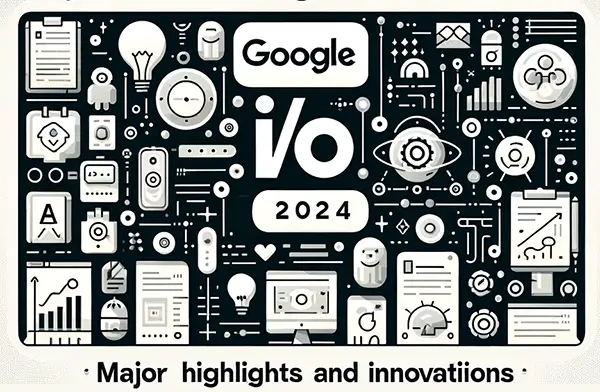Google I/O 2024 has just concluded, leaving the tech world buzzing with exciting announcements and groundbreaking innovations. This year’s event, held at the Shoreline Amphitheatre in Mountain View, California, was a testament to Google’s ongoing commitment to artificial intelligence and cutting-edge technology. From significant upgrades to the Gemini AI model to new tools and features for developers, here’s a comprehensive look at the key highlights from Google I/O 2024.
Major Upgrades to Gemini AI
One of the most anticipated announcements was the introduction of Gemini 1.5 Pro and the new Gemini 1.5 Flash. Gemini 1.5 Pro now boasts a context window of one million tokens, making it more powerful and versatile for developers and consumers alike. The lightweight Gemini 1.5 Flash, designed for speed and efficiency, offers a cost-effective solution without compromising performance.
In addition to these, Google unveiled Project Astra, a visionary initiative aimed at creating universal AI agents to assist in everyday life. Astra’s multimodal capabilities will leverage the full potential of Gemini, integrating seamlessly across various applications and devices.
Gemini’s New Models: PaliGemma and Gemma 2.0
The Gemini family continues to grow with the introduction of PaliGemma and Gemma 2.0. PaliGemma, inspired by the PaLI-3 model, integrates vision and language processing. Gemma 2.0, featuring a new architecture for enhanced performance and efficiency, promises to set new standards in AI model development.
Gemma 2.0 introduces several variants tailored to specific tasks and industries, including healthcare, finance, and creative arts. Its flexible architecture supports a range of applications from complex data analysis to creative content generation.
Generative AI for Google Search
Google Search is being revolutionized with the integration of generative AI, thanks to the tailored Gemini model. Sundar Pichai, CEO of Google and Alphabet, described it as “Google Search at the scale of human curiosity.” This new capability allows for AI-powered overviews, providing users with comprehensive and synthesized information, effectively transforming how we search online.
With the new generative AI features, users can expect more intuitive search experiences, where the AI not only provides answers but also suggests related topics and deeper insights, making the search process more engaging and informative.
SynthID and LearnLM
SynthID, Google’s watermarking tool for AI-generated content, has been expanded to include text and video. This development aims to ensure authenticity and transparency in the digital content landscape, addressing concerns about misinformation and deepfakes.
LearnLM, a new family of models based on Gemini, is designed to function as personal AI tutors. This initiative brings the dream of personalized education closer to reality, offering tailored learning experiences to users. LearnLM can adapt to individual learning styles and provide real-time feedback, making education more accessible and effective.
Enhanced Developer Tools
Google has rolled out several new features for developers, including video frame extraction, parallel function calling, and context caching. These advancements emphasize the importance of long context and are set to launch next month. Meanwhile, Gemini 1.5 Pro and Flash are now available globally in over 200 countries and territories.
These tools aim to empower developers to create more sophisticated and efficient applications, leveraging the full capabilities of Gemini’s AI technology.
Gemini Nano and Multimodality for Pixel
Later this year, Gemini Nano with multimodality will be available on Pixel devices. This version differs from Gemini 1.5 Pro, offering unique capabilities tailored for the Pixel ecosystem. Users can expect enhanced features such as real-time language translation, advanced image recognition, and seamless integration with other Google services.
AI-Enhanced Android Experience
Android is being reimagined with AI at its core. Google is introducing AI-powered search and Gemini, a new AI assistant, to Android smartphones. This update will allow Gemini to utilize on-screen data more effectively, providing users with real-time assistance and insights.
This AI-enhanced experience aims to make Android devices more intuitive and helpful, anticipating user needs and providing proactive support.
Project Starline’s Commercialization
Google announced the commercialization of Project Starline, a technology that creates a “magic window” experience for immersive remote communication. Partnering with HP, Google plans to integrate Starline with video conferencing services like Google Meet and Zoom by 2025.
Project Starline aims to bridge the gap between virtual and in-person communication, offering a more natural and engaging experience for remote interactions.
Imagen 3 and VEO for Generative Media
Imagen 3, the latest AI model for photorealism, promises enhanced detail and natural prompt interpretation. Alongside, Google introduced VEO, a generative video AI model capable of creating 1080p videos from text prompts in various cinematic styles.
These advancements in generative media open up new possibilities for content creation, from realistic imagery to dynamic video production, enhancing both professional and creative workflows.
New Hardware and TPUs
Sundar Pichai also introduced the sixth generation of TPUs, named Trillium, offering a 4.7x performance improvement. These will be available to Cloud customers later this year. Additionally, the Axion processor with a custom ARM-based CPU and NVIDIA’s Blackwell GPUs will become available in early 2025.
These hardware innovations are set to boost the performance of AI models, enabling more complex and resource-intensive applications to run efficiently.
Conclusion
Google I/O 2024 was a showcase of how far AI and technology have come and where they are headed. With significant advancements in the Gemini AI model, new tools for developers, and the integration of generative AI into Google Search, the future looks promising for both developers and users. As Google continues to push the boundaries of technology, we can expect even more innovative solutions that enhance our everyday lives.


